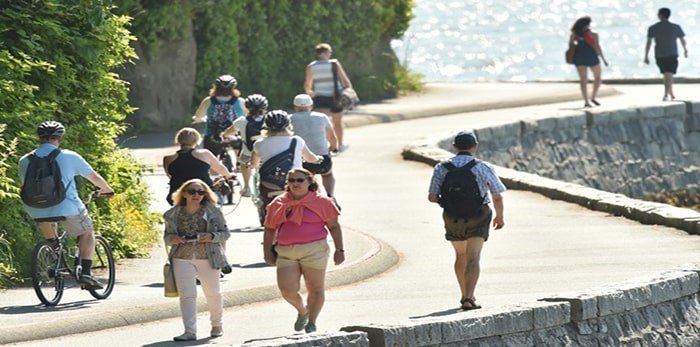 A city-commissioned survey conducted in May polled residents and business people about their quality of life in Vancouver. Photo Dan Toulgoet
A city-commissioned survey conducted in May polled residents and business people about their quality of life in Vancouver. Photo Dan Toulgoet
Howâs your quality of life?
Maybe you were one of the 602 chatty residents to answer that question in a city-commissioned âcivic service satisfaction surveyâ conducted by Ipsos market research firm between May 1 and May 22.
Or maybe you were one of the 201 owners, managers or operators of a business who also provided an answer to the same question.
If you did respond, you were at least 18 years old and answered in English, Mandarin or Cantonese.
So what did everybody say?
Similar to responses in last yearâs survey, youâre generally a happy lot, according to the results I read in a staff report that was to go before Â鶹´«Ã½Ó³»city council today.
The survey findings are attached to a broader report on what the cityâs finance staff is forecasting budget-wise from 2020 to 2024. Hint: expect more taxes.
The survey didnât just ask about quality of life, but other stuff like what residents and businesses thought about the value of city services they receive or have access to.
Iâll get to some of that data at the end of this piece.
For now, letâs hear peopleâs responses to the quality of life question.
âOverall, 89 per cent of residents and 92 per cent of businesses say the quality of life in Â鶹´«Ã½Ó³»today is âvery goodâ or âgood,ââ the survey findings said.
Which is great to hear.
Except thereâs more to the story.
When asked how Vancouverâs quality of life had changed in the past three years, 48 per cent of residents said it stayed the same. Thirteen per cent said it improved, whereas 36 per cent said it worsened.
Among businesses, 50 per cent said it stayed the same, 14 per cent said it improved and 36 per cent said it worsened, which was 10 points down from last year.
Letâs explore this furtherâ¦
The survey asked those who said quality of life had improved why it did.
The number one answer kind of surprised me.
Thatâs because I assumed quality of life gets better for most people when they earn a decent salary, find a comfortable place to live and can genuinely enjoy each day as it comes.
Apparently, Iâm dead wrong, according to 57 people who provided reasons for their quality of life improving; Iâm speculating those 57 folks already make or made good money, have a place to live and enjoy a good quality of life.
Because hereâs their answer:
âTransportation and infrastructure are the leading open-ended reasons behind perceptions of an improved quality of life.â
Nearly one quarter of residents attributed âimproved transportation optionsâ as why their quality of life improved. Another 15 per cent mentioned âimproved infrastructure/roads.â
Other frequently mentioned responses included âthings are getting better/city is improvingâ (11 per cent) and âaccess to green space/more parks availableâ (10 per cent).
For the record, employment opportunities ranked sixth at nine per cent.
Which brings me to âreasons quality of life has worsened,â which had a significantly higher number of respondentsâ235âthan the 57 people who were over the moon with improved transportation options.
Hands down, the reasons quality of life worsened for residents and businesses was âcost of living.â
Number two for residents was âhousing/accommodations,â followed by âovercrowding/overpopulation/overdevelopment.â Then it was âpoverty/homelessnessâ and âtraffic congestion.â
Similar responses were given by businesses.
But get this: Low salaries and wages ranked seventh for residents and businesses, which kind of runs counter to cost of living being the number one reason for quality of life being worse.
This is why, dear readers, that stats stories boggle the mind without a detailed explanation from respondents. So take the data for what itâs worth.
Same goes for this quote from the report related to city services:
âOverall, 86 per cent of residents and 80 per cent of businesses say they are satisfied [combined âvery/somewhat satisfiedâ ratings] with the overall level and quality of services provided by the City of Vancouver.â
For residents, that means a big thumbs up to libraries, parks and green spaces, emergency services and recreation facilities and opportunities.
For business people, they were happy with many of the same services, especially online payment services, which received a 91 per cent approval rating.
Again, thereâs more to the story, as residents pointed out.
âThe single least satisfactory service is enabling affordable housing, with only 30 per cent of residents saying they are satisfied with the cityâs performance in this area. Nearly seven in 10 say they are dissatisfied, including 28 per cent saying ânot at all satisfied.ââ
Translation: quality of life could be improved for a lot of people in this city.


